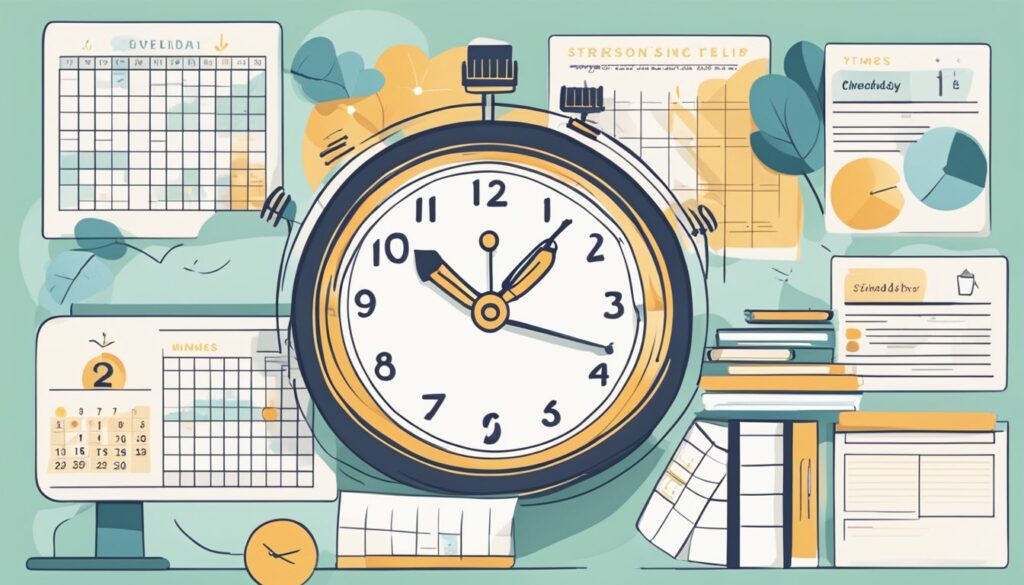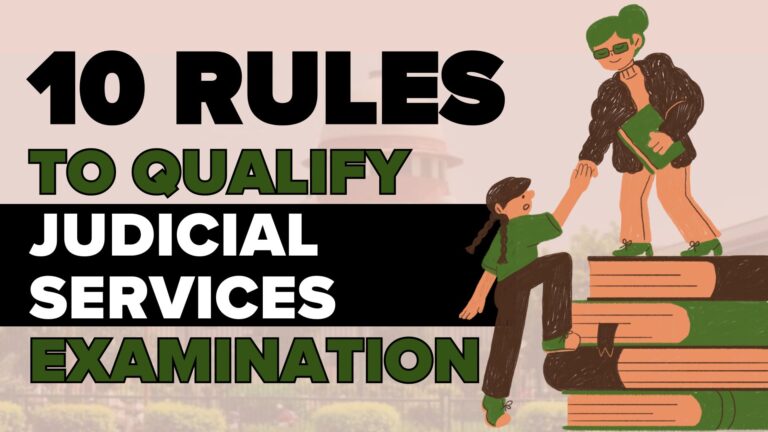Time Management and Stress Reduction Techniques for Judiciary Aspirants: A Comprehensive Guide

As a judiciary aspirant, you are likely no stranger to stress and time management challenges.
With the high demands of studying for exams, preparing for interviews, and maintaining a work-life balance, it can be bit tedious and burnt out.
However, developing effective time management and stress reduction techniques can help you stay on track and achieve your goals without sacrificing your well-being.
One of the first steps in managing your time effectively is to prioritize your tasks.
This involves identifying which tasks are most important or urgent and allocating your time accordingly. You can use tools like calendars, to-do lists, and scheduling apps to help you stay organized and on top of your deadlines.
Additionally, it is important to set realistic goals and avoid overcommitting yourself, as this can lead to unnecessary stress.
In addition to time management, reducing stress is also crucial for judiciary aspirants.
Stress can negatively impact your mental and physical health, as well as your ability to focus and perform well in exams.
Some effective stress reduction techniques include exercising regularly, practicing mindfulness and meditation, and seeking support from friends or family.
By prioritizing your well-being and developing healthy coping mechanisms, you can reduce stress and increase your overall productivity and success as a judiciary aspirant.
Page Contents
Understanding Time Management

As a judiciary aspirant, time management is an essential skill that can help you achieve your goals and reduce stress. In this section, you will learn about the importance of time management for judiciary aspirants and effective time management techniques.
Importance of Time Management for Judiciary Aspirants
Time management is crucial for judiciary aspirants because of the demanding nature of the profession.
As a judiciary aspirant, you need to balance your studies, work, and personal life effectively. Failure to manage your time properly can lead to stress and poor performance. Effective time management can help you prioritize your tasks, develop a study plan, and achieve your goals.
It can also help you reduce stress by giving you more control over your schedule and allowing you to focus on the most important tasks.
Effective Time Management Techniques
Here are some effective time management techniques that can help you as a judiciary aspirant:
- Planning: Create a daily, weekly, and monthly schedule to help you stay organized and focused. Identify your most important tasks and prioritize them accordingly.
- Scheduling: Schedule your tasks according to your energy levels and the time of day. For example, if you are most productive in the morning, schedule your most important tasks during that time.
- Prioritization: Prioritize your tasks based on importance and urgency. Focus on the most important tasks first, and then move on to less important tasks.
- Efficiency: Use time-saving techniques such as delegation, automation, and batch processing to increase your efficiency and productivity.
By implementing these techniques, you can develop effective time management skills that will help you achieve your goals and reduce stress as a judiciary aspirant.
Stress Management Techniques
As a Judiciary aspirant, managing stress is crucial to maintaining a healthy and productive lifestyle.
Here are some effective stress management techniques that you can use to reduce stress and improve your overall well-being.
Time Management as a Stress Reducer
Time management is one of the most important skills that you need to master as a Judiciary aspirant.
By managing your time effectively, you can reduce stress and increase your productivity. Make a schedule for your study and other activities, and stick to it as much as possible.
Prioritizing Tasks and Deadlines
Prioritizing your tasks and deadlines is another important stress management technique.
Make a list of tasks that you need to complete and prioritize them based on their importance and deadline. This will help you stay organized and reduce stress.
Creating an Effective Study Schedule
Creating an effective study schedule is crucial for Judiciary aspirants.
Make a study schedule that is realistic and achievable. Divide your study time into smaller sessions and take breaks in between to avoid burnout.
Importance of Sleep and Rest
Getting enough sleep and rest is essential for reducing stress and improving your overall well-being.
Make sure you get at least 7-8 hours of sleep every night and take breaks throughout the day to rest your mind and body.
Physical Exercise and Yoga
Physical exercise and yoga are great stress management techniques.
Exercise releases endorphins, which can improve your mood and reduce stress. Yoga can help you relax and reduce anxiety.
Breathing Exercises and Meditation
Deep breathing exercises and meditation are effective stress management techniques.
Deep breathing can help you relax and reduce anxiety. Meditation can help you clear your mind and reduce stress.
Nutrition and Health
Eating a healthy and balanced diet is important for reducing stress and improving your overall health.
Avoid junk food and eat plenty of fruits, vegetables, and whole grains. Drink plenty of water to stay hydrated.
Tools and Resources

As a Judiciary aspirant, you need to manage your time effectively and reduce stress to achieve your goals. To help you with this, there are several tools and resources available that can aid in planning, measurement, organization, and reading. Here are some of the most useful ones:
Stress Reduction Resources
Stress can hinder your productivity and make it difficult to concentrate. To combat this, you can use various resources such as meditation apps, stress balls, and aromatherapy.
Calm and Headspace are two popular meditation apps that can help you relax and reduce stress.
Stress balls are small balls that you can squeeze to relieve tension and improve blood circulation. Aromatherapy involves using essential oils to create a calming atmosphere and promote relaxation.
Educational Materials and Reading
To prepare for the Judiciary exams, you need to read extensively and gain knowledge in various subjects such as law, politics, and current affairs.
There are several resources available that can aid in your reading and learning. Some of the most useful ones include newspapers, magazines, books, and online courses.
The Hindu, The Indian Express, and The Times of India are some of the most popular newspapers that can provide you with daily news and updates.
Magazines such as India Today and Frontline can provide you with in-depth analysis and opinion pieces.
Books such as Indian Polity by M. Laxmikanth and Introduction to the Constitution of India by DD Basu can provide you with a comprehensive understanding of the Indian Constitution.
Time Management Apps and Software
Effective time management is crucial for success in any field, and Judiciary exams are no exception.
There are several apps and software available that can help you manage your time effectively. Some of the most useful ones include Trello and Google Calendar.
Trello is project management tools that can help you organize your tasks and track your progress. Google Calendar is a scheduling app that can help you manage your appointments and deadlines.
Seeking Help from Professional
As a judiciary aspirant, you may face a lot of stress and pressure during your preparation and examination. While self-help and stress management techniques can be helpful, sometimes seeking from professionals is necessary to manage your stress levels.
A mental health professional, such as a therapist or counselor, can help you identify the root causes of your stress and develop effective coping mechanisms.
They can also provide you with a safe and non-judgmental space to express your concerns and emotions. In addition to mental health professionals, lawyers can also be a valuable resource for aspirants.
They can provide guidance on the legal profession and help you navigate the application and examination process. They may also have insights on stress management techniques specific to the legal field.
Remember, seeking professionals help is not a sign of weakness, but rather a proactive step towards managing your stress and achieving your goals.
Don’t hesitate to reach out for help if you feel overwhelmed or stressed during your journey to becoming a judge.
Conclusion

In conclusion, time management and stress reduction are crucial skills for judiciary aspirants to develop.
By implementing the techniques discussed in this post, you can effectively manage your time, reduce stress levels, and increase productivity.
Remember to prioritize your tasks, set realistic goals, and use time-tracking tools to monitor your progress. Make sure to take breaks and practice self-care to avoid burnout and maintain a healthy work-life balance.
In addition, consider incorporating stress-reducing activities into your daily routine, such as meditation, exercise, or spending time with loved ones. These activities can help alleviate stress and improve your overall well-being.
By mastering time management and stress reduction techniques, you can enhance your chances of success in this field. All the Best!







